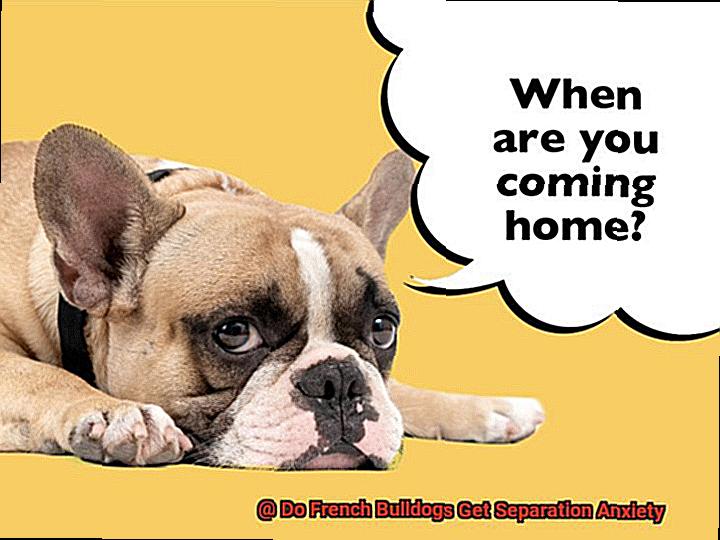Do French Bulldogs Get Separation Anxiety?
Hey there, fellow French Bulldog enthusiasts. Are you the proud parent of a Frenchie or thinking about bringing one into your family? Well, today we’re going to talk about something that might be on your mind – separation anxiety in French Bulldogs. These little bundles of joy are known for their adorable looks and loving nature, but do they also struggle with being apart from their humans? That’s what we’re here to find out.
In this blog post, we’ll take a deep dive into the world of French Bulldogs and separation anxiety. We’ll explore their unique temperament, how they form attachments with their humans, and the telltale signs that your furry friend might be feeling anxious when left alone. And don’t worry if you’re looking for some tips and tricks to help ease your Frenchie’s anxiety – we’ve got you covered there too.
So grab a cup of coffee (or tea if that’s more your thing) and get ready to learn all about our favorite squish-faced companions and their relationship with separation anxiety. Whether you’re a seasoned Frenchie owner or just curious about this fascinating breed, this post is for you. Let’s jump right in and uncover the truth about French Bulldogs and separation anxiety.
What is Separation Anxiety in French Bulldogs?
Contents
- 1 What is Separation Anxiety in French Bulldogs?
- 2 Why Do French Bulldogs Experience Separation Anxiety?
- 3 Symptoms of Separation Anxiety in French Bulldogs
- 4 Preventing Separation Anxiety in French Bulldogs
- 5 Training and Desensitization for French Bulldogs with Separation Anxiety
- 6 Professional Help for Severe Cases of Separation Anxiety
- 7 Conclusion
We all know how much our adorable little fur babies love being by our side. But what happens when we have to leave them alone? Separation anxiety can be a real struggle for both dogs and their owners. In this comprehensive guide, we’ll dive into the world of separation anxiety in French Bulldogs, explore its causes and symptoms, and provide practical strategies to help alleviate the anxiety. So grab a cup of coffee and let’s get started.
Understanding Separation Anxiety in French Bulldogs:
Separation anxiety is a common behavioral issue that affects many dog breeds, including our beloved French Bulldogs. These sociable and affectionate pooches tend to form strong attachments to their owners, making them more susceptible to separation anxiety. It’s crucial to differentiate between separation anxiety and general misbehavior, as scolding or punishment will only worsen the condition.
Symptoms of Separation Anxiety:
French Bulldogs suffering from separation anxiety may exhibit various signs of distress when left alone. These can include excessive barking or howling that could wake up the whole neighborhood, destructive behavior (think chewed-up shoes or scratched doors), house soiling (even though they’re usually house trained), pacing back and forth anxiously, drooling excessively, and even trying to escape from their confinement.
Causes of Separation Anxiety:
There are several factors that can contribute to separation anxiety in French Bulldogs. This includes inadequate socialization during puppyhood, traumatic experiences, sudden changes in routine or environment, or being rehomed. Understanding these underlying causes is essential in developing effective strategies to manage the condition.
Alleviating Separation Anxiety:
While dealing with separation anxiety can be challenging, don’t fret. Here are some practical tips to help your French Bulldog feel more comfortable when you’re away:
- Gradual Desensitization: Start by leaving your Frenchie alone for short periods and gradually increase the duration over time. Reward calm behavior and make their alone time a positive experience.
- Mental Stimulation: Provide plenty of mental and physical stimulation before leaving, such as puzzle toys or interactive games. A tired Frenchie is a happy Frenchie.
- Calming Aids: Consider using pheromone diffusers or calming music to create a soothing environment for your pup.
- Safe Space: Create a cozy and secure space where your Frenchie can relax during your absence. This can be a crate or a designated area with their favorite toys and bedding.
- Professional Help: In severe cases, consult a qualified dog behaviorist who specializes in separation anxiety. They can provide personalized guidance and support tailored to your French Bulldog’s needs.
Why Do French Bulldogs Experience Separation Anxiety?
French Bulldogs are beloved for their affectionate nature and loyalty. However, these adorable fur babies can also be prone to separation anxiety, a condition that causes distress and anxiety when they are separated from their owners. In this blog post, we will explore the reasons behind why French Bulldogs experience separation anxiety and provide insights on how to address this issue.
Strong Attachment:
French Bulldogs form deep bonds with their primary caregivers. They thrive on human companionship and can become anxious when separated from their owners. The fear of abandonment plays a significant role in their separation anxiety, as they have an innate need to be close to their loved ones.

Sensitivity to Change:
French Bulldogs are highly sensitive to changes in their environment and routine. Any disruption or deviation from their daily routine, such as being left alone for extended periods, can trigger anxiety. Their sensitive nature makes them more susceptible to separation anxiety.
Need for Companionship:
French Bulldogs crave social interaction and can feel lonely when left alone for long periods. Lack of companionship can lead to anxiety, which may manifest through behaviors like excessive barking, destructive chewing, or house-soiling.
Genetic Predisposition:
Certain genetic factors may make French Bulldogs more prone to separation anxiety. While not all French Bulldogs will develop this condition, some may have a genetic predisposition that increases their vulnerability.
Early Experiences:
The early experiences of a French Bulldog can shape its tendency to develop separation anxiety later in life. If a puppy has not been gradually desensitized to being alone and lacks proper socialization, it may develop a fear of being left alone as an adult.
Symptoms of Separation Anxiety in French Bulldogs
- Excessive Barking: One common symptom of separation anxiety in French Bulldogs is excessive barking. They may bark continuously or howl, seeking attention or expressing their distress.
- Destructive Behavior: Another sign of separation anxiety is destructive behavior. French Bulldogs may chew on furniture, shoes, or other household items as a way to cope with their anxiety and alleviate their stress.
- Urinating and Defecating Indoors: When experiencing separation anxiety, French Bulldogs may have accidents indoors, even if they are usually well-trained. This behavior is a result of their heightened stress levels and can be frustrating for owners to deal with.
- Escape Attempts: Some French Bulldogs with separation anxiety may try to escape from the house or yard in an attempt to find their owners. They may scratch doors, windows, or dig under fences, putting themselves at risk of injury or getting lost.
- Pacing and Restlessness: Restlessness and constant pacing are common symptoms of separation anxiety in French Bulldogs. They might move from room to room, unable to settle down due to their anxious state.
- Excessive Salivation: Excessive drooling or salivation is another symptom that may indicate separation anxiety in French Bulldogs. This can be seen as wet spots on the floor or furniture where they have been lying.
- Loss of Appetite: Some French Bulldogs with separation anxiety may lose their appetite when left alone. They may refuse to eat their meals or eat significantly less than usual due to the stress and emotional distress they are experiencing.
- Depression or Withdrawal: Separation anxiety can also manifest as depression or withdrawal in French Bulldogs. They may become lethargic, uninterested in activities they usually enjoy, and seem overall sad when separated from their owners.
- Clinginess: French Bulldogs with separation anxiety often display clingy behavior when their owners are present. They may follow their owners around the house, constantly seeking attention and reassurance.
- 10. Excessive Greeting Behavior: When reunited with their owners after a period of separation, French Bulldogs with separation anxiety may exhibit hyperactive and overly excited behavior. They may jump, lick, or paw at their owners excessively as a way to express their relief and seek reassurance.
It is important to note that not all dogs will exhibit every symptom, and the severity of the symptoms can vary. If you suspect your French Bulldog is experiencing separation anxiety, it is recommended to consult with a veterinarian or a professional dog trainer for guidance and assistance in managing this condition.
Preventing Separation Anxiety in French Bulldogs
French Bulldogs, with their adorable wrinkly faces and expressive eyes, are known for their strong attachment to their owners. While this loyalty is endearing, it can also lead to separation anxiety when they are left alone. But fear not. With a few preventive measures and a little patience, you can help your French Bulldog feel more secure and confident when you’re not around. So, let’s dive into some tried-and-true techniques to prevent separation anxiety in these lovable pups.
- Start Early: Like teaching a puppy to roll over or fetch, preventing separation anxiety is best started from an early age. Puppies are more adaptable and can learn to cope with being alone if introduced gradually and positively.
- Gradual Desensitization: Just like dipping your toes into a cold pool before taking the plunge, gradual desensitization is key. Start by leaving your French Bulldog alone for short periods and gradually increase the duration over time. This helps them build confidence and realize that being alone is not a scary experience.
- Create a Safe Space: Imagine having your own cozy den where you can relax and unwind. Well, your French Bulldog needs one too. Designate a specific area with their bed, toys, and familiar scents. This creates a safe and comfortable space that helps alleviate anxiety.
- Engage Their Minds: Boredom can exacerbate separation anxiety, so leave interactive toys and puzzles for your furry friend to keep them engaged and distracted while you’re away. It’s like giving them a mental workout.
- Establish a Consistent Routine: Dogs thrive on routine, just like we do. Incorporate regular feeding times, exercise sessions, and playtime into their daily schedule. This provides a sense of security, knowing what to expect each day.
- Keep Departures and Arrivals Low-Key: We all love a warm welcome when we come home, but for a dog with separation anxiety, it can reinforce their anxiety. Instead, try to maintain a calm and matter-of-fact demeanor when leaving and returning home. This helps your French Bulldog understand that departures and arrivals are no big deal.
- Obedience Training: Enroll your French Bulldog in obedience training classes. Not only will this help build their confidence and independence, but it also provides mental stimulation. Training exercises that promote self-control and focus can be particularly beneficial in preventing separation anxiety.
- Socialize, Socialize, Socialize: Introduce your French Bulldog to other dogs and people from a young age. This helps reduce their dependence on you and makes them more comfortable being alone. Plus, it’s always fun to have a social butterfly for a furry friend.
Training and Desensitization for French Bulldogs with Separation Anxiety
In this article, we’ll explore how crate training, desensitization, and mental stimulation can make a world of difference for French Bulldogs struggling with separation anxiety.
Crate Training: A Safe Haven
- Introduce the crate as a positive space with soft bedding and toys.
- Gradually increase the time your Frenchie spends inside, rewarding calm behavior.
- Close the crate door for short periods while staying nearby, gradually extending the duration.
- Remember to respect your dog’s individual tolerance level and always associate the crate with positive experiences.
Desensitization: Tackling Anxiety Triggers
- Identify triggers that cause anxiety in your French Bulldog, such as picking up keys or putting on shoes.
- Start at a level where your dog remains calm and gradually increase the intensity or duration of the trigger over time.
- For example, if picking up keys causes anxiety, start by simply touching them in front of your dog. Gradually progress to jingling them and then picking them up and putting them down.
- The goal is for these triggers to become neutral or even positive experiences for your Frenchie.
Mental Stimulation: Keeping Busy Minds
- Provide interactive toys and puzzles to distract your French Bulldog from their anxiety when left alone.
- These activities engage their minds and provide an outlet for excess energy.
- Puzzle toys that dispense treats are particularly effective in keeping them occupied and entertained.
Patience and Consistency: The Key to Success
- Remember that every dog is unique, and progress may vary.
- Be patient and consistent, working at a pace that feels comfortable for your French Bulldog.
- Gradually increase the difficulty of the training and desensitization exercises as your dog becomes more confident and relaxed.
By implementing these training and desensitization techniques, you can help your French Bulldog overcome separation anxiety and lead a happier, more independent life. Remember to approach the process with patience, consistency, and a tailored approach that suits your dog’s individual needs.
Professional Help for Severe Cases of Separation Anxiety
While crate training, desensitization, and mental stimulation can be effective strategies for managing mild cases, severe cases require professional help. In this article, we will explore why seeking professional assistance is essential and how it can transform the lives of French Bulldogs struggling with separation anxiety.
Understanding the Severity of Separation Anxiety:
Severe cases of separation anxiety in French Bulldogs manifest in various ways, such as destructive behavior, excessive barking, or even self-harm. These behaviors indicate heightened distress and require specialized attention from professionals. An expert dog trainer or behaviorist should be consulted to accurately assess the severity and develop a tailored treatment plan.
The Role of Medication:
In severe cases, medication may be recommended to help manage the dog’s anxiety and facilitate behavior modification. This could involve the use of anti-anxiety medications prescribed by a veterinarian who specializes in behavioral issues. Medication, when used in conjunction with behavior modification techniques, can significantly improve a Frenchie’s quality of life.
Implementing Behavior Modification Techniques:
Under the guidance of a professional, behavioral modification techniques such as desensitization and counterconditioning can be implemented. These techniques help the Frenchie become more comfortable with being alone by gradually exposing them to shorter periods of separation. A professional will tailor these techniques to suit your dog’s specific needs while providing guidance and support throughout the process.
Consistency and Patience:
Owners must consistently follow the professional’s recommendations and be patient with the process. Remember, behavior modification takes time, and progress may be gradual. However, with dedication and consistency, significant improvements can be achieved.
Regular Check-ins and Adjustments:
Regular check-ins with the professional are crucial for monitoring your Frenchie’s progress and making any necessary adjustments to the treatment plan. These check-ins ensure that your dog’s needs are being met and that the treatment plan remains effective.
The Involvement of a Veterinary Behaviorist:
In severe cases, a veterinary behaviorist may be involved to provide specialized assistance. These professionals have advanced knowledge in addressing the underlying causes of separation anxiety and can offer additional support and expertise.
Conclusion
In conclusion, it is evident that French Bulldogs are prone to experiencing separation anxiety. This condition can be distressing for both the dog and their owner. It is important for owners to recognize the signs of separation anxiety in their French Bulldogs and take proactive steps to address and manage this issue.
French Bulldogs, with their affectionate and loyal nature, form strong bonds with their owners. When left alone for extended periods, they may become anxious and exhibit behaviors such as excessive barking, destructive chewing, or inappropriate elimination. These signs indicate their distress and longing for companionship.
To alleviate separation anxiety in French Bulldogs, a gradual desensitization process can be implemented. This involves gradually increasing the duration of time spent apart from the dog while providing them with positive reinforcement and engaging toys or puzzles to keep them occupied.
Additionally, creating a safe and comfortable space for your French Bulldog when you are away can help ease their anxiety. Providing them with familiar scents, such as an unwashed t-shirt or blanket that carries your scent, can provide a sense of security.
Seeking professional help from a veterinarian or animal behaviorist is also recommended if the separation anxiety persists or worsens despite your efforts. They can provide expert guidance tailored to your specific situation and offer additional strategies or medications if necessary.
Ultimately, understanding and addressing separation anxiety in French Bulldogs is crucial for ensuring their well-being and maintaining a harmonious relationship between dog and owner.




